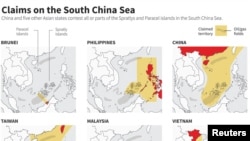American experts and investors are closely watching political, military and economic developments in the South China Sea. Some observers are worried that China’s territorial claims and activities in the area could lead to a war. But other people disagree.
This week, China and the United States exchanged strong words about Chinese efforts to build and develop islands in the South China Sea. Chinese crews have been creating airfields on what was, until recently, underwater land.
A week ago, U.S. Secretary of Defense Ashton Carter criticized China’s actions. He accused Chinese officials of being “out of step” with international values.
“There should be an immediate and lasting halt to land reclamation by all claimants. We also oppose any further militarization of disputed features. We all know there's no military solution to the South China Sea disputes.”
He also made it clear that the U.S. would not recognize any Chinese attempt to declare a 22-kilometer territorial sea limit around disputed islands or coral reefs.
China has expressed strong dissatisfaction with U.S. military flights near its newly-developed islands.
At a conference in Singapore, a top Chinese military official defended his country’s efforts to develop the South China Sea. He called the work, “justified, legitimate and reasonable.”
Another official, Senior Colonel Zhao Xiaozhuo criticized Secretary Carter’s comments about new sea limits as “groundless.”
“The freedom of navigation in the South China Sea is not at all an issue because the freedom has never been affected.”
Expert and investor warn of larger conflict
Gordon Chang wrote a book called “The Coming Collapse of China.” He says the South China Sea could become what he calls the next “Great War Zone.”
Mr. Chang spoke recently at a meeting of the U.S. Air Force Association, a private group. He said the United States will soon answer China’s actions in the South China Sea.
In his words, “the U.S. Navy is clearly going to test China’s claims of exclusion of the South China Sea.” He said the United States has to do so. He noted that for the past 200 years, U.S. officials have defended the right of ships to sail freely in international waters. He said China is now testing that policy.
Mr. Chang said China sees the South China Sea as one of its main interests and does not believe it should negotiate on the issue.
Rick Fisher is a senior research fellow at the International Assessment and Strategy Center. He told VOA that the world should closely watch the development of nuclear weapons in China and North Korea. He said that while North Korea seems quiet now, it will probably use the South China Sea disputes to show its power.
Mr. Fisher said that as soon as there is a crisis, North Korea could become very dangerous.
“As soon as North Korea can demonstrate that it can fire a nuclear missile,” he said, “then (the) North…becomes a factor.” He noted that North Korea could decide to use the tensions in the South China Sea for its own purposes and put greater pressure on the United States. He thinks it could use this pressure to demand action from South Korea or the U.S. government.
Mr. Fisher admits that North Korea and the Chinese government do not agree about everything. But he said the two sides share and act on the same Communist beliefs.
Billionaire George Soros is a well-known American investor. He recently expressed concern about the Chinese actions in the South China Sea. He spoke at a meeting of the World Bank. He said that if China suffers economic problems, it could lead to a third world war. He said a conflict could strengthen China’s national unity and ease the economic difficulties.
Mr. Soros said there is a high possibility of a military conflict between China and Japan. He says because the U.S. has promised to defend Japan, it could be forced to take military action against China. He says the result could be World War III.
Tad Daley works at the Center for War/Peace Studies. He is the director of a program that seeks to end war. He disputes claims that the South China Sea issues are a result of China’s plans for use of nuclear weapons. He says China seems to only want the ability to answer a nuclear attack, not to launch the first strike.
He says in the 1970s, China told American officials that if they launched nuclear strikes, China would still have the ability to answer. China said it would be able to hit the U.S. cities of Los Angeles and San Francisco with its remaining missiles.
I’m Christopher Jones-Cruise.
VOA Asia Correspondent Steve Herman and Reporter Shen Hua reported this story. Christopher Jones-Cruise adapted it for Learning English. George Grow was the editor.
________________________________________________________________
Words in the News
groundless – adj. not based on facts
factor – n. something that helps produce or influence a result; one of the things that cause something to happen
Do you believe China’s actions in the South China Sea will lead to a third world war? We want to hear from you. Write to us in the comments section.







